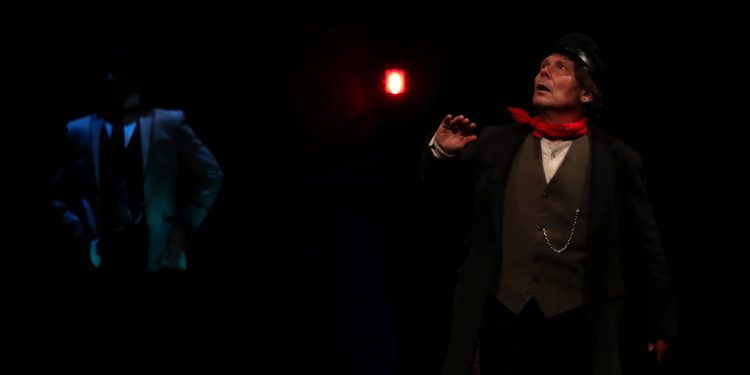Review: The Signal-Man at Nottingham Theatre Royal
The Signal-Man has been one of my favourite short stories since I first read it several years ago. A ghost story, it was originally published in 1866 by Charles Dickens just a year after he was involved in the horrific Staplehurst Rail Crash which killed 10 people and left Dickens with what we would now likely refer to as PTSD. The book has been adapted for stage, screen, and radio multiple times (including a 1953 adaptation starring Boris Karloff) and was even referenced in Doctor Who, yet it remains one of Dickens’ lesser-known works. Over the summer, I learned that a stage adaptation (first produced in 1997) was touring close to home and last week I convinced my sister to come along and watch a matinee performance with me at Nottingham’s Theatre Royal, giving you the opportunity to read what will be a fairly rare play review!
At only 56 pages, The Signal-Man doesn’t provide a wealth of material to draw from for crafting a play, so I was expecting some new material and this was definitely delivered. We never learn much about the two main characters in the original book, they don’t even have names, but the play provided detailed backstories for both the signal-man himself and the young narrator. The signal-man - now named Joseph Standcot - tells of his youth in London and good education by way of explaining how it is he ended up doing such a “menial” job working on the railways. The young narrator is named Richard Brightwell and he also talks about his education and the role it played in derailing a blossoming young romance, leading to an unimaginable tragedy just months earlier. It seems obvious that the men’s stories will intersect, but just how and why we are left to guess, at least early on.
The heart of The Signal-Man is the troubles being faced by Standcot on the evening he first encounters Brightwell. After some prompting, Standcot reveals that he has witnessed a ghostly figure standing at the mouth of a nearby tunnel. The first time he saw this figure, it preceded a horrific rail crash in the tunnel by only a few hours. The second time, it appeared in mourning and Standcot quickly learned that a young lady had died aboard the next train. Now, the spectre is appearing again and Standcot is desperate to know what this third tragedy will be and either how he can prevent it, or why the ghost insists on torturing him if he cannot.
The revelation of this third tragedy naturally forms the climax of both the book and the play but it’s here that the biggest changes have been made to Dickens’ original story. I found one of the key changes involving Standcot to be rather gimmicky, seemingly added to appease modern audiences looking for a big twist who may have found the original ending more than a little tame and are looking for a more cinematic horror element here. Another of the significant changes, this time involving Brightwell, felt as if it had been added purely for shock value - I certainly didn’t see it coming - and I questioned its necessity, feeling as if it had once again been included to add more modern cinematic horror to the original plot. However, I suspect I am in the minority in both these viewpoints and those unfamiliar with the original story are even more unlikely to agree with me as these changes have been added so smoothly as to be unnoticeable to anyone going into the theatre without prior knowledge.
The changes to the story allow The Signal-Man to explore themes of grief and guilt in a more complex way, focusing intently on whether or not we can move on from guilt and whether we should be allowed to. Both men are harbouring guilt of some kind and consider themselves responsible for tragedy, whether directly or indirectly. It is arguable whether or not Standcot’s spectre is sent to him and him alone because he deserves to be haunted due to his actions as a younger man and this question is never answered, allowing the audience to speculate about the nature of this haunting between themselves. I, for one, have yet to form any solid conclusions.
Suffice it to say, The Signal-Man was a very pleasant way to pass two hours with some brilliant casting and effects, and even despite my feelings regarding the changes in the second act, it’s a play I would highly recommend going to see should it tour close to your home in the future.
Read The Signal-Man: Amazon Affiliate






